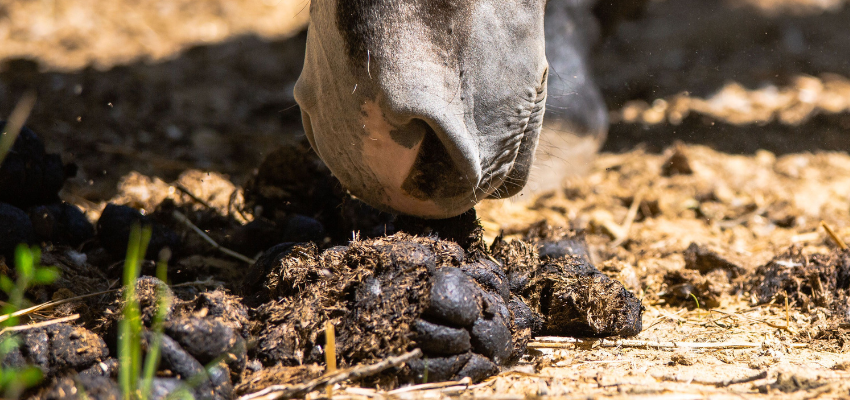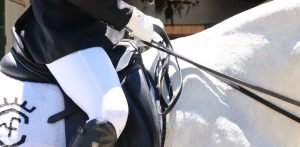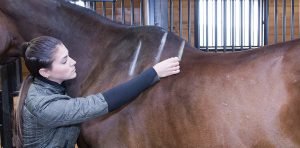Gastrointestinal issues such as colic, diarrhea, bloating, and fecal water syndrome are unfortunately not uncommon. In this article, you will learn everything about the causes, diagnosis, treatment, and prevention of fecal water syndrome.
What is fecal water syndrome?
Fecal water syndrome refers to the liquid that cannot be adequately bound by the intestine due to a malfunctioning digestive system. Therefore, it is not a disease in itself but rather a symptom of various causes. This fluid in the intestine then emerges due to intestinal movement. Often, the horse produces normally formed to slightly mushy droppings. Sometimes, fecal water occurs without any droppings.
Difference between diarrhea and fecal water syndrome?
If your horse’s droppings are mushy or even watery, it appears lethargic, and has little to no appetite, it might be suffering from diarrhea. With diarrhea, the entire intestinal flora is disturbed and your horse loses a lot of fluid and electrolytes. Therefore, diarrhea often stresses and weakens your horse’s body more and for longer, and also weakens the immune system.
What causes fecal water syndrome?
It can have various causes:
Diet-related causes
Fecal water syndrome can be caused by diet, which includes:
Inappropriate roughage feeding
One possible cause is the inappropriate feeding of roughage. Sufficient high-quality roughage is essential for a healthy gut flora. Thus, too little roughage or long breaks between feeds can promote fecal water syndrome. The texture of the fibers plays a crucial role as it influences how well water can be bound in the intestine. Fibers in not-too-young pasture grass and hay from mid-cut are rich in cellulose and can bind water very well. On the other hand, fibers in over-mature hay and straw are rich in lignin and cannot bind water well.
Nutrient Deficiency & Nutrient Excess
Both long-term nutrient deficiency and an excess of vitamins and minerals can be causes. Your veterinarian or a feed consultation can answer whether your horse needs mineral feed, which one, and how much.
Feed Change
A change in feed can also be triggering. Your horse’s gastrointestinal tract is very sensitive. Even small changes can cause stress. Therefore, a gradual feed transition is essential.
Toxic Plants
If your horse accidentally consumes a toxic plant, it can lead to fecal water syndrome.
Housing-related causes
Besides diet-related causes, there can also be housing-related reasons:
Lack of Movement
Lack of movement can be a cause. This is because your horse’s intestinal wall stores water to maintain a balanced ratio in the organism. If your horse doesn’t get enough exercise, this water remains unused and is expelled as fecal water. Discover diverse ideas and exercises for ground work and in-hand work on our website, and let yourself be inspired.
Stress
Stress can also be a trigger. If your horse suffers from stress due to unfamiliar situations, training, competitions, trailer rides, or life within its herd, this can literally upset its stomach, leading to fecal water syndrome. Linda Tellington Jones shows you on our website how to help your horse reduce stress and relax using the world-famous TTouches.
Sand
If your horse is kept on a sand paddock, it can ingest sand. Often, horses ingest sand unintentionally, for example, when you feed roughage from the sandy ground, or if the pasture has been overgrazed. Some horses also eat sand out of boredom when they don’t have enough roughage available. However, your horse’s intestine can’t digest sand. This results in sand remaining on the intestinal mucosa, causing irritation, which in turn can lead to fecal water syndrome.
Health-related Causes
Health-related causes can trigger it, such as:
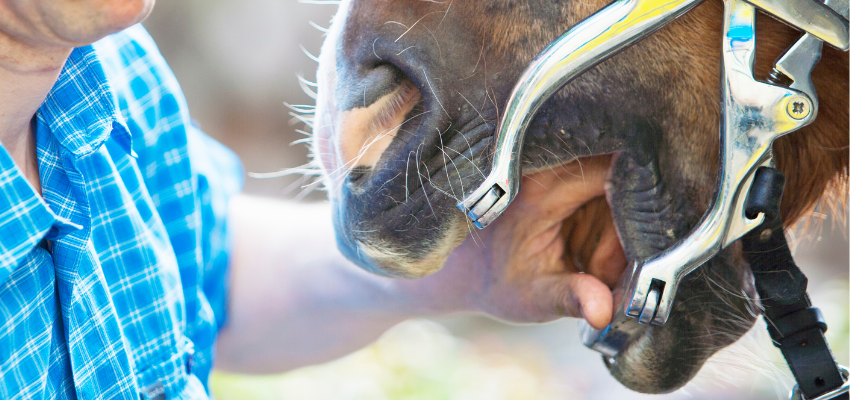
Dental Issues
Tooth problems, such as inflammation, hooks, or age-related poor tooth substance, can impair your horse’s chewing activity. If your horse doesn’t chew its food sufficiently, larger food pieces enter the gastrointestinal tract. Moreover, your horse doesn’t produce enough saliva, leading to a drop in the stomach’s pH value. This can result in the stomach lining becoming damaged, which can manifest in the form of fecal water syndrome.
Parasites
If your horse suffers from parasites, like worms, it can be a possible cause of fecal water syndrome.
Medication
Medications, such as antibiotics, can negatively impact your horse’s intestinal flora and cause fecal water syndrome.
Heart Issues
If your horse has a weak heart, it can lead to a thickening of the intestinal wall. This can prevent the intestine from optimally absorbing both essential nutrients and water, which can lead to fecal water syndrome.
Liver & Kidney Issues
Liver and kidney problems can also lead to fecal water syndrome. If your horse’s liver is overburdened or its kidneys are too weak, the detoxification function of these organs is disrupted. This results in toxins being excreted through your horse’s intestine, leading to irritation and fecal water syndrome.
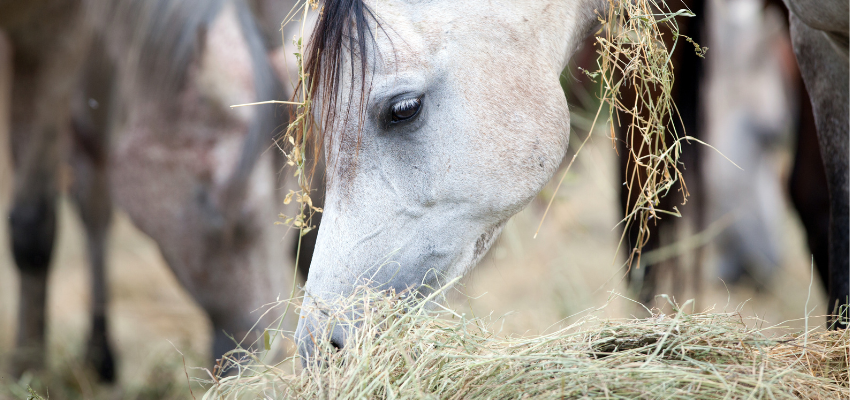
How can I treat fecal water syndrome?
These aspects can assist you in treatment:
- Proper Hay Feeding: Ensure that your horse receives sufficient high-quality hay (1-1.5kg hay/ 100kg body weight). It’s essential for your horse’s healthy gut flora. Also, feeding breaks should never exceed 3-4 hours.
- Proper Mineral Feed Feeding: To prevent nutrient deficiency or excess, determine if your horse needs mineral feed, and if so, which type and how much. Your veterinarian or a feed consultation can assist with this.
- Removal of Poisonous Plants: Keep your horse’s paddock and pasture free from toxic plants.
- Adequate Exercise: Ensure that your horse gets enough exercise to keep the digestion process active.
- Avoiding Stress: Find out the cause of the stress and try to reduce it.
- Reduce Sand Intake: Try to minimize sand intake. Don’t feed your horse hay directly from the sandy ground and ensure the pasture isn’t overgrazed.
- Veterinarian: If the diarrhea persists despite eliminating potential causes, consult your veterinarian. They can check your horse for dental problems, parasite infestations, and issues with the heart, liver, and kidneys.
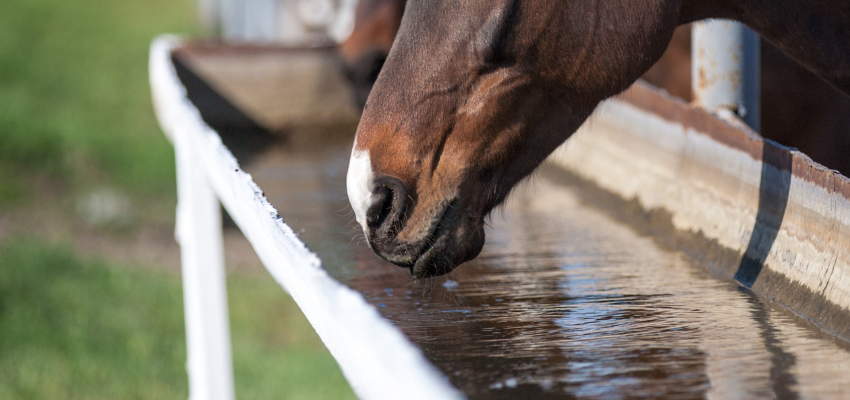
How can I prevent diarrhea in horses?
These measures can help you prevent diarrhea in horses:
- Feeding sufficient high-quality hay
- Proper mineral feed feeding
- Providing clean and fresh drinking water
- Gradual change in diet
- Removal of toxic plants from paddock and pasture
- Adequate exercise
- Avoiding stress
- Preventing sand ingestion
- Regular dental check-ups
- Regular parasite checks
How dangerous is diarrhea in horses?
Diarrhea is not immediately a cause for panic. As you can see, there can be many different reasons for it. However, the diarrhea should subside after a few days. If it doesn’t, contact your veterinarian to rule out serious causes.
Our Conclusion
Diarrhea in horses can have causes related to feeding, living conditions, and health. Try to identify the exact cause and take appropriate measures to treat it. Proper feeding and species-appropriate care can help you prevent diarrhea.


